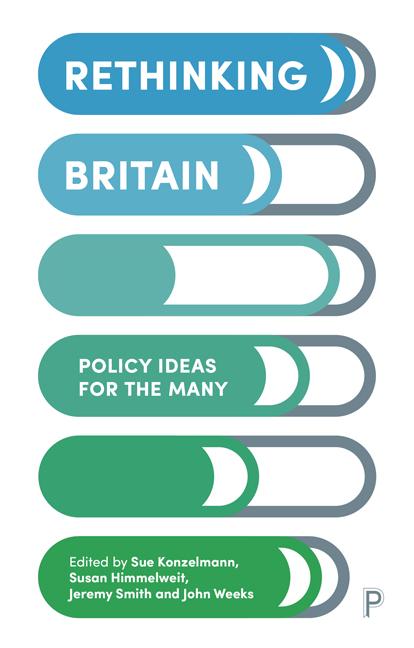Book contents
- Frontmatter
- Contents
- List of Tables and Figures
- The Contributors
- Foreword
- Introduction
- Interlude: ‘Mirror, Mirror, On the Wall – Who has the Highest Debt of All?’
- Part One Building a Full-Employment Economy: Introduction
- Part Two Public Investment – Prioritising Society Rather than Profit: Introduction
- Part Three Making Finance Work for Society: Introduction
- Part Four Genuine Social Security: Introduction
- Part Five How to provide for Social Needs: Introduction
- Conclusion
- Jargon Busters
- References and Further Reading
- Index
7 - The Macroeconomic Role of Progressive Taxation
Published online by Cambridge University Press: 11 March 2021
- Frontmatter
- Contents
- List of Tables and Figures
- The Contributors
- Foreword
- Introduction
- Interlude: ‘Mirror, Mirror, On the Wall – Who has the Highest Debt of All?’
- Part One Building a Full-Employment Economy: Introduction
- Part Two Public Investment – Prioritising Society Rather than Profit: Introduction
- Part Three Making Finance Work for Society: Introduction
- Part Four Genuine Social Security: Introduction
- Part Five How to provide for Social Needs: Introduction
- Conclusion
- Jargon Busters
- References and Further Reading
- Index
Summary
What's the issue?
Capitalist economies tend to instability, ‘boom and bust’. An active fiscal policy can moderate that instability with short-term spending and taxation measures (see Policy idea 2, this part). Those measures will be more effective if policies reduce the systemic instability of the private economy.
How can tax policy be used to reduce the instability of the private economy?
Analysis
The common perception of taxation is that it serves to fund expenditures. While that is correct to an extent (see Policy idea 2, this part), taxation has at least two other major functions. It can serve as a vehicle of social policy to affect the distribution of income in society. In Britain the distribution of household income after deduction of taxes is considerably more equitable than pre-tax income. Statistics from the Office for National Statistics (ONS) show that for the fiscal year 2016/17 the pretax ratio of the richest fifth of the population to the poorest fifth was 12:1. The after-tax ratio fell by almost half, to 6.4:1.
The inequality-reducing effect of the tax system plays an important role in stabilising the economy. If a tax system is progressive, tax revenue increases more than national income increases and vice-versa. Statistics from the ONS monthly report Public Sector Finances show that during 2011–17, when the Conservative Chancellor reduced the progressivity of the tax structure, the average rate of change of public revenue remained significantly above the rate of change of GDP. The ratio of the former (rate of revenue change) to the latter (rate of GDP change) is known as the ‘income elasticity of revenue’.
That real-world behaviour relationship has a direct impact on the stability of our economy. When a recession hits, business income falls, leading to a fall in business profits, income and private employment. The fall in employment provokes households to reduce their spending as some suffer unemployment and wages tend to fall for those still holding jobs. Household retrenchment of consumption spending adds to, or multiplies, the fall in business investment. If the tax system is progressive, household after-tax income, disposable income, falls less than pre-tax income, leaving more income for consumption expenditures. Pre-tax and after-tax refer to income tax only.
- Type
- Chapter
- Information
- Rethinking BritainPolicy Ideas for the Many, pp. 43 - 45Publisher: Bristol University PressPrint publication year: 2019



